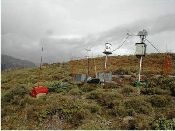| Study site location & description |
 |
|
The Dzhanibek study site is located near the settlement of Romashki, east of the Volga River.
Dzhanybek is located in the southeast of European Russia and is a hazard-prone zones which manifests both climatic and anthropogenic-induced desertification due to regional-scale degradation of the natural, agricultural and irrigated lands. Desertification control, soil conservation and reclamation are the urgent ecological tasks for the Caspian region of Russia. 55-years successful scientific experience of Dzhanibek Research Station allows recommending for dissemination a wide range of desertification control and management options for prevention land degradation based on agroforestry amelioration methods and silvicultural amelioration of croplands.
The Dzhanibek Research Station with nearby monitoring points includes (1) a virgin 55-years reserved site, (2) agroforestry protective systems (for arable and pasture protection), (3) the currently used and abandoned pastures and irrigated sites. This wide range of landscapes allows defining sustainability of the ecosystems to anthropogenic pressure. The research station staff includes 3 Doctors of Science and 10 Ph.D. researchers. The station’s database contains results of local monitoring during 55 years of weather conditions, soil and plant parameters dynamics on different sites.
Realization of the DESIRE project will allow offering for wide dissemination ecologically adaptive agroforestry technology of nature management and desertification control and land degradation.
|
||||||||||||||||
Study sites

Acknowledgement
The DESIRE project was
|
DESIRE brought together the expertise of
26 international research institutes
and non-governmental organisations.
This website does not necessarily
represent the opinion of the
European Commission. The European
Commission is not responsible for
any use that might be made of the
information contained herein. 








